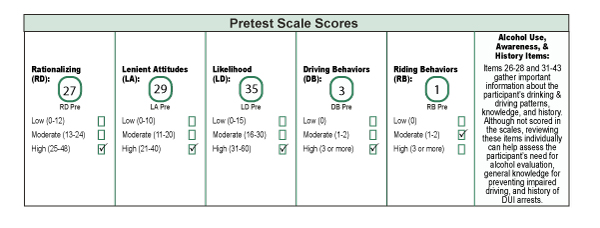Mr. M. is a 38-year-old Caucasian male, presenting to the DUI Court with a second DUI offense. His first offense occurred and he was sentenced to time served (1 day), one year probation, paid a $500 fine, and his driver’s license was suspended for 90 days. Mr. M.’s probationary period from his first offense ended successfully.
A year later, Mr. M. was arrested and entered into a no contest plea for drinking and driving under the influence. Mr. M. went before the court and asked for leniency on his conviction, yet expressed willingness to comply with any recommendations set by the court. Judge sentenced Mr. M. to 2 days served in the county jail followed by 2 years of DUI Court participation and 12 months driver’s license suspension.
Background Information: Mr. M. is a manager at a local insurance firm, where he has worked for the past nine years. Mr. M. has a bachelor’s degree in business from a state college. Mr. M. is married and has two young children. Mrs. M. is employed full-time as a teacher.
Medical and Mental Health History: Mr. M. is of average height and weight. He stated that his health is very good without significant medical problems, except for a back injury that he sustained last year that continues to cause him pain. Mr. M. does smoke cigarettes. He has a family history of cardiovascular disease and high blood pressure. Mr. M. did not report any history of mental health problems of his own or in his family.
Substance Use History: Mr. M. reported that he began drinking when he was 17 years of age during his senior year in high school. Mr. M. stated that he drank on weekends “with the guys” while in school and reported his use as “normal.” He maintained above a 2.5 grade point average throughout college and did not report any alcohol violations during this time. He did report drinking to intoxication approximately two to four times per month.
After college, Mr. M. was hired by his current employer. He reported that during his years with the company, he received excellent evaluations and was quickly promoted to his current managerial position. Mr. M. stated that after his first DUI conviction, he has tried to maintain a “no drinking and driving” policy and limits his alcohol intake to weekends only.
Mr. M. attributed his recent absences from work to lower back pain. Mr. M. denied drinking in the morning, withdrawal symptoms such as shaking or sweating, or loss of control of his use. He denied experiencing any recent blackouts or other behavioral changes.
DUI Court Intake: The County DUI Court uses the Behaviors & Attitudes Drinking & Driving Scale (BADDS) at entry into the program and following the approximate two years of participation in drug court activities. Mr. M.’s BADDS results follow.
BADDS Pretest Results: Mr. M. has high scores on four scales: Rationalizations for Drinking and Driving (RD: 27), Lenient Attitudes (LA: 29), Likelihood of Drinking and Driving (LD: 35), and Drinking and Driving Behaviors (DB: 03). Mr. M. scored in the moderate range for Riding Behaviors with a Drinking Driver (RB: 01).
Mr. M.’s responses on the alcohol use and history items, in contrast to his stated attempts to limit his drinking to weekends, revealed that he drinks alcohol daily. Responses also showed that either he or someone significant to him has been in an alcohol-related accident. Despite his best efforts to refrain from drinking and driving, Mr. M. acknowledged that he drove under the influence and rode as a passenger in a vehicle of someone who had been drinking, within the month prior to his arrest.
Mr. M.’s high scores on the RD, LA, LD, and DB scales indicate that he has endorsed and acted upon risky beliefs and attitudes about drinking and driving. In addition, his responses on the LD scale suggest that it is acceptable to him to drive under certain circumstances after having at least three or four drinks. Mr. M.’s perception about how many drinks he can consume in one hour and drive safely and legally is just below probable legal limit based on his body weight. Further, Mr. M.’s RB score indicates that he has recently ridden in a vehicle with an impaired driver.
Summary and Recommendations: Mr. M. enters into the DUI program as a sentencing requirement set by Judge Andrews after completing a 2-day incarceration.
Mr. M.’s BADDS results indicate that he is a suitable candidate for a DUI program that would help him learn about the risks of drinking and driving, and examine his beliefs about safe driving behavior. In addition, an evaluation for substance use disorder will be conducted in the next session with Mr. M. Without intervention, Mr. M.’s scores suggest that he is at high risk of recidivism. The re-administration of the BADDS prior to his completion of the DUI court program would help to assess if there has been change in his risky behaviors and attitudes that could continue to put him at risk for further problems with impaired driving, if they are not adequately addressed.

